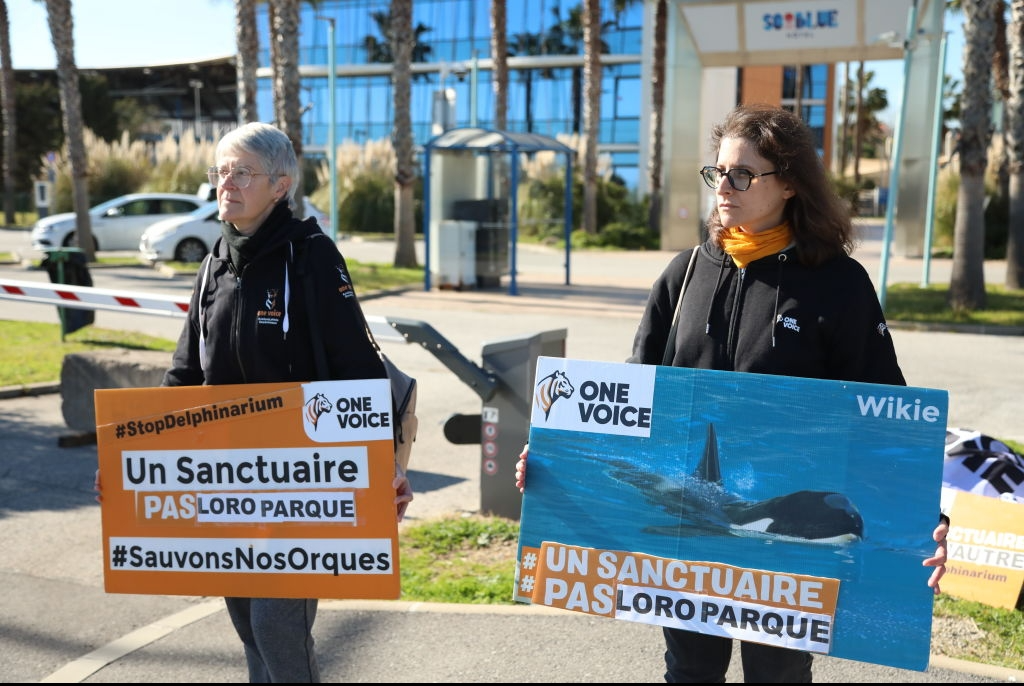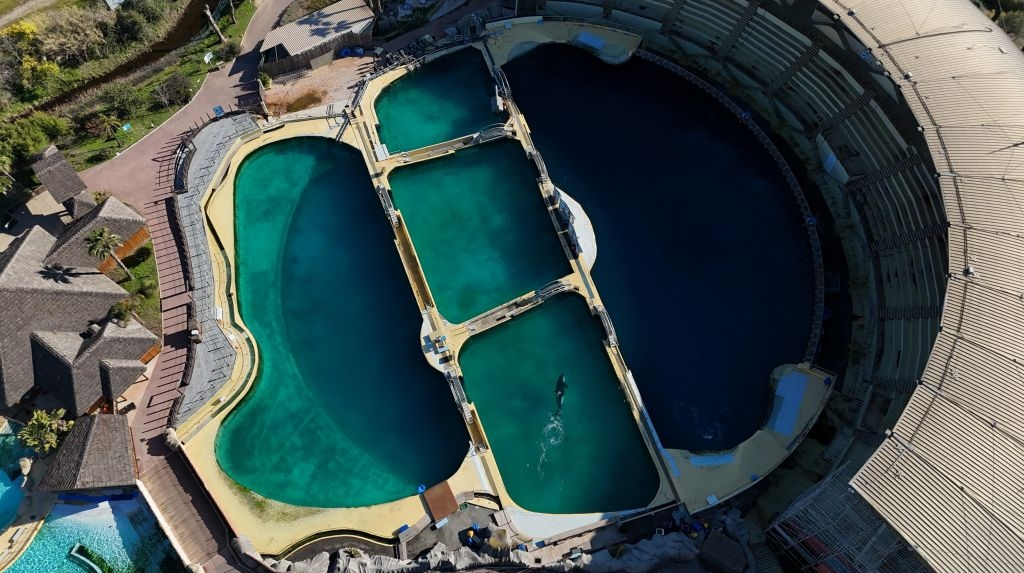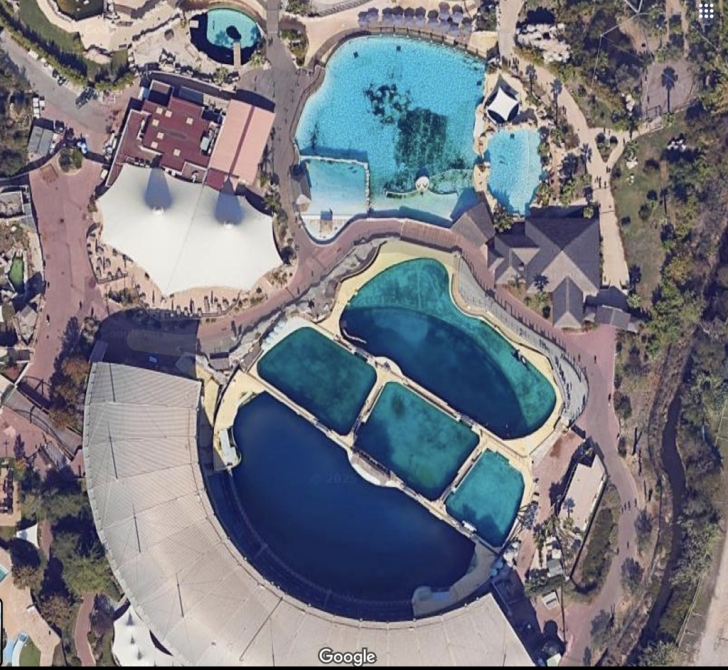**Echoes in Concrete: The Last Captive Orcas of France and the Silence That Enslaves Them**
Tucked between the luxurious sprawl of the French Riviera and the quiet majesty of the Alpes-Maritimes lies a stark, unsettling contradiction. In Antibes, not far from the yachts and Michelin-starred restaurants, is a hollowed monument to entertainment’s bygone cruelty—a marine park whose applause has long faded.
Marineland Antibes, once bustling with camera flashes and clapping crowds, now stands silent, crumbling, and forgotten. But within its weathered walls, two sentient beings remain shackled to a life never of their choosing: Wikie and her son Keijo—the last captive killer whales in France.
Once poster icons of oceanic spectacle, these orcas now swim in the ruins of a failed legacy, their sleek bodies slicing through stagnant, algae-dappled waters that reek of abandonment. Drone footage released by the conservation group TideBreakers in early May 2025 captured an eerie and tragic portrait—corroded infrastructure, empty stadium seats, and lifeless pools. The world has moved on. But Wikie and Keijo remain, trapped in a decaying prison where the only sound is the echo of their own movements.
### A Law Passed, A Promise Broken

When France became one of the few nations to outlaw cetacean performances, the move was heralded as a progressive victory. Headlines lauded the country for taking a bold stand against marine mammal exploitation. Marineland, once a cornerstone of family entertainment, was among the most visibly affected. As of January 2025, its doors closed permanently.
But while the stage has been dismantled and the crowd dispersed, no curtain fell for Wikie and Keijo. Instead, they were left behind—symbols of a legislative milestone with no follow-through. No sanctuary. No rehabilitation. Just bureaucratic paralysis and the faint hope that someone, somewhere, is still fighting for them.
### Despair in Silence: The Unseen Lives Within
To see the state of Marineland today is to witness a slow, quiet erasure. The paint peels. The water stagnates. The facilities rot. And inside this grim tableau, two highly intelligent, emotionally rich orcas are left to weather the decline with no stimulation, no enrichment, and no escape. The drone footage offers no spectacle—just a still life of suffering.
Keijo, born in captivity, has never known the vastness of the ocean or the joy of true social bonds. Wikie, once forced to mimic human speech in a controversial experiment, now lives out her days in bleak repetition. These are not just animals—they are complex, self-aware beings. And yet, they have been reduced to remnants of entertainment, ignored by the very system that once profited from them.
### A Bureaucratic Abyss: Promises Deferred and Dignity Denied
While Marineland is legally bound to care for the orcas, the institution lacks the resources, infrastructure, and, arguably, the will to offer them anything resembling a humane existence. Official statements from the park’s management call for urgent relocation, echoing the pleas of international animal welfare groups. But words have not translated into action.
Efforts to rehome Wikie and Keijo have stumbled repeatedly. A proposed transfer to a Japanese facility was abruptly derailed by France’s own Ministry for Ecology over welfare compliance concerns.
Another initiative to send the pair to Loro Parque in Spain crumbled under scrutiny—its facilities deemed unfit for animals already emotionally and physically compromised by captivity.
So they remain. Not because no one wants them—but because the machinery of progress is stuck in idle.
### Legal, Medical, and Ethical Chaos
What keeps Wikie and Keijo imprisoned isn’t just the lack of options—it’s a morass of overlapping legal frameworks, missing medical documentation, and ethical impasses. Allegations of veterinary neglect, poor hygiene standards, and failing filtration systems have surfaced, pointing to violations of both French law and European Union directives governing the treatment of exotic species.

Transporting an orca is not a simple matter of logistics—it requires advanced health screening, specialized behavioral assessments, and insurance protocols so stringent that most parks and governments hesitate to sign off. According to Dr. Marielle Laurent, a marine mammal legal specialist, “The transfer of a killer whale isn’t a single event—it’s a medical, legal, and moral gauntlet. And no one appears willing to lead.”
### A Glimmer Across the Atlantic: The Canadian Sanctuary That Stands Ready
Amid this quagmire, one beacon of hope continues to flicker: The Whale Sanctuary Project (WSP) in Port Hilford Bay, Nova Scotia. Unlike aquariums, WSP is a non-profit, sea-pen facility crafted to rehabilitate retired captive whales in a more natural, enriched environment. The site has passed environmental assessments, permits have been granted, and marine life experts are on standby.

Led by luminaries such as Lori Marino and Charles Vinick—veterans of the Keiko release mission—the sanctuary offers specialized veterinary care, round-the-clock monitoring, and the promise of a peaceful, dignified life away from concrete tanks. Yet despite this readiness, the French government has failed to respond to WSP’s most recent, updated relocation proposal.
“We’ve done our part,” Marino said. “Now we wait on the one thing we can’t control—political will.”
### An Official Silence that Grows Louder by the Day
In the months following the collapse of the Spanish relocation plan, France’s Ministry of Ecology has grown conspicuously quiet. Agnès Pannier-Runacher, once vocal about exploring European alternatives, has issued no new statements. No follow-up. No progress reports. Just silence.
Activists and concerned citizens have taken to social media, using the hashtag #SaveWikieAndKeijo to pressure lawmakers. Petitions circulate. Open letters are sent. International news outlets raise the alarm. Yet still, the orcas remain where they are, each day pushing them closer to the point of no return—psychologically and physically.
“It’s not just negligence,” says Emilie Fournier of OceanKind Europe. “It’s willful abandonment wrapped in bureaucratic excuses.”
### When Reform Lacks Resolve
Wikie and Keijo’s story is more than a tale of two whales. It is an indictment of a system that knew how to legislate against cruelty but failed to build the bridges needed for compassion. France banned the show but forgot the stars. And in doing so, it revealed a flaw that transcends borders: the gap between intention and implementation.
“You cannot pass a law and then walk away,” said Dr. Jan Schmidt-Burbach of World Animal Protection. “These animals are not legislative footnotes. They are lives, waiting for dignity.”
View this post on Instagram
### Conclusion: A Crisis of Conscience, Not Capacity
As sunseekers flock to the Riviera, drawn by its beauty and charm, a more sobering truth lingers just a few miles away. In Marineland’s empty amphitheater, Wikie and Keijo continue their silent routines, circling the same chlorinated confinement with no end in sight.
They are not waiting for a rescue—they are waiting for someone to care enough to act.
This isn’t a story about logistics. It’s a story about values. About whether a society that claims to champion empathy can extend that empathy to those it once exploited. Wikie and Keijo have performed their last trick. They’ve endured every delay, every failed promise. The question now is not whether they can survive—but whether we, as a species, are capable of grace.
The clock is ticking. Not just for them—but for us.
